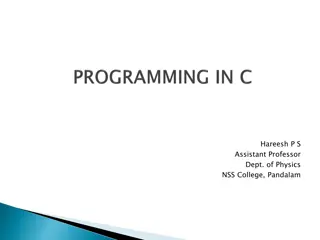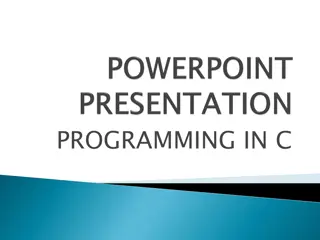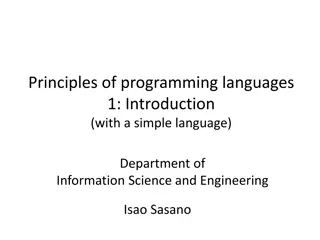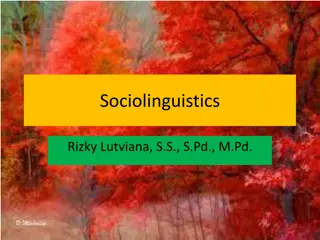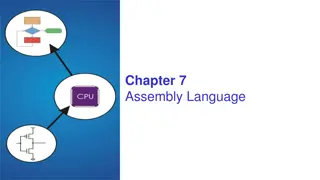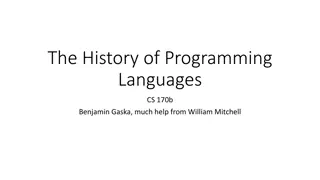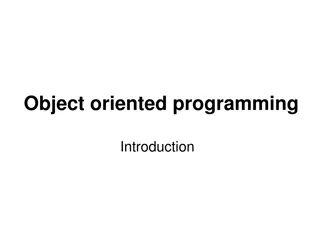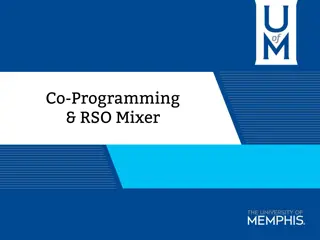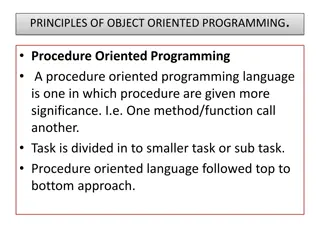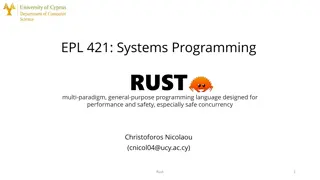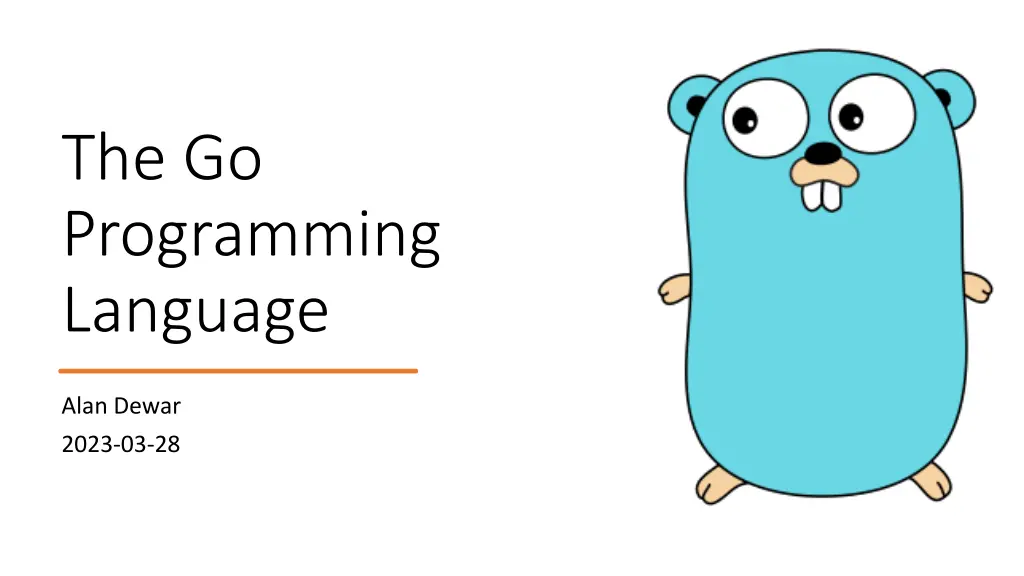
Go Programming Language Insights and History
Explore the journey of the Go programming language from its inception to its adoption by tech giants like Google and PayPal. Learn about its key features, usage in container technology, and the team behind its development.
Download Presentation

Please find below an Image/Link to download the presentation.
The content on the website is provided AS IS for your information and personal use only. It may not be sold, licensed, or shared on other websites without obtaining consent from the author. If you encounter any issues during the download, it is possible that the publisher has removed the file from their server.
You are allowed to download the files provided on this website for personal or commercial use, subject to the condition that they are used lawfully. All files are the property of their respective owners.
The content on the website is provided AS IS for your information and personal use only. It may not be sold, licensed, or shared on other websites without obtaining consent from the author.
E N D
Presentation Transcript
The Go Programming Language Alan Dewar 2023-03-28
The Go Programming Language Who s Using Go History and Philosophy Key Features and Omissions Language Constructs Error Handling Concurrency Standard Library Tools Quirks Learning Go
My Background MSc, Computer Science CUUG Board of Directors since 1998 Synopsys since 2017
Languages Ive Used APL Assembly languages COMPASS (CDC) ALM (Multics) 6502 68020 SPARC BASIC C, C++ FOCAL FORTRAN, Fortran Go Java JavaScript Lisp, Scheme PL/I Pascal PostScript Prolog Ruby Shell: sh, bash, csh Simula SNOBOL Tcl
Whos Using Go Google Core data solutions team: web indexing services Chrome content optimization service Firebase hosting team: static web hosting services Site reliability engineering team Docker, Kubernetes Go is the language of containers, cloud
Whos Using Go PayPal Netflix Meta Uber Dropbox Ethereum GitLab Synopsys
History Initial Whiteboard Session, 2007-09-21 Robert Griesemer: Google Rob Pike: Unix, Plan 9, UTF8 Ken Thompson: Unix, Plan 9, UTF8 Rob Pike photo by Kevin Shockey - https://www.flickr.com/photos/shockeyk/4833152910/in/photostream/, CC BY 2.0, https://commons.wikimedia.org/w/index.php?curid=33256884
History Additional Key Team Members, 2008 Ian Lance Taylor: gcc, Taylor UUCP, gccgo Russ Cox: Google, interfaces, I/O library
History Releases 2009-11-10: Public open source project 2012-03-28: go1 2023-02-01: go1.20 Every six months
History Designed by Google to help solve Google s problems Slow builds Uncontrolled dependencies C/C++: #include, #ifndef _SYS_STAT_H Each programmer using a different subset of the language Code hard to read, poorly documented Cost of updates Difficulty of writing automatic tools
Philosophy Influenced by Plan 9 from Bell Labs Focus on clarity, simplicity Clean syntax, few keywords Simple grammar All three: Efficient compilation Efficient execution Ease of programming Familiar C-like
Philosophy Compatibility Go 1 compatibility promise Programs should continue to work through all 1.x releases Exceptions Security Undefined behavior Spec errors Bugs New fields, methods, and exports Package unsafe
Key Features Fast compilation to native binary Static typing Automatic garbage collection Static initialization Error handling Concurrency Reflection Modern standard library Tools
Key Omissions Header files (#include) Forward declarations Inheritance Unions Pointer arithmetic Implicit type conversion Including numeric Default function arguments Function name overloading Type aliases Assignment as expression ++, -- as expression implements Exceptions Ternary ?: operator Assertions
Notable Fatal Errors Cyclic dependencies Unused variables Unused imports
Hello World package main import "fmt" func main() { fmt.Println("Hello, ") }
Language Constructs: Types bool int, int8, int16, int32, int64, uint, uint8, uint16, uint32, uint64 float32, float64 complex64, complex128 Array, slice struct Pointer Function interface map channel
Language Constructs: Declarations Declarations Go var fn func([]int) int type T struct { a, b int } C int (*fn)(int[]); struct T { int a, b; } Scope Exported (visible to importers): start with capital Unexported (not visible to importers): start with lower-case
Language Constructs: Statements foo := bar a, b = b, a for i := 0; i < 10; i++ { } for i, thing := range things { } if x < 0 { } else { } switch runtime.GOOS { case "darwin": fmt.Println("OS X.") case "linux": fmt.Println("Linux.") default: fmt.Println("Other.") } func main() { defer fmt.Println("world") fmt.Println("hello") }
Language Constructs: Methods func with receiver type Vertex struct { X, Y float64 } func (v Vertex) Abs() float64 { return math.Sqrt(v.X*v.X + v.Y*v.Y) } Not limited to structs type MyFloat float64 func (f MyFloat) Abs() float64 { if f < 0 { return float64(-f) } return float64(f) }
Language Constructs: Interfaces Set of methods Duck typing type Abser interface { Abs() float64 } func (f MyFloat) Abs() float64 { if f < 0 { return float64(-f) } return float64(f) } func main() { var a Abser = MyFloat64(-math.Sqrt2) fmt.Println(a.Abs()) }
Error Handling error type type error interface { func Error() string } Function return convention func foo() (string, error) { if happy() { return "Good!", nil } else { return "", fmt.Errorf("I am not happy.") } }
Concurrency goroutines Light-weight threads Shared memory go f(x, y, z) Channels Sending and receiving values of a given type Receiver blocks until a value is available Multiple senders and/or receivers Don t communicate by sharing memory; share memory by communicating.
Concurrency: Example func fibo(c, quit chan int) { x, y := 0, 1 for { select { case c <- x: x, y = y, x+y case <-quit: fmt.Println("quit") return } } } func main() { c := make(chan int) quit := make(chan int) go func() { for i := 0; i < 10; i++ { fmt.Println(<-c) } quit <- 0 }() fibo(c, quit) }
Standard Library (some examples) archive: tar, zip compress: bzip2, gzip, lzw, crypto: aes, des, ecdsa, md5, rand, rsa, sha512, tls, x509, database: sql encoding: base64, json, xml, fmt html image: gif, jpeg, png, io math net: http, mail, url, os reflect regexp sync testing time
Tools go run go build go mod go test go vet gofmt godoc cgo
Quirks Function s open brace must be on same line as func Implicit semicolon Constants are untyped Interface holding nil value is not equal to nil goroutine scope for _, v := range values { v := v // This is essential! go fmt.Println(v) } Date format fmt.Println(time.Now().Format("2006-01-02 15:04:05 -0700"))
Learning Go Official web site: https://go.dev/ A Tour of Go: https://go.dev/tour/ The Go Playground: https://go.dev/play/ Language specification: https://go.dev/ref/spec Standard packages: https://pkg.go.dev/std Effective Go: https://go.dev/doc/effective_go





